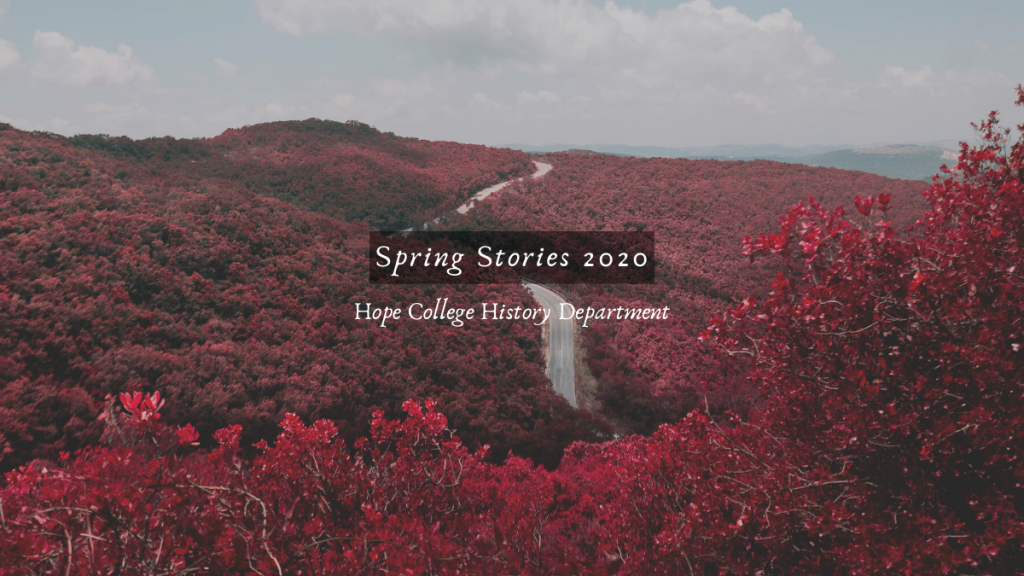The spring semester of 2020 has not worked out the way any of us expected it to, or hoped it would. Since Hope College announced, on March 10, that we would be moving to on-line education after Spring Break, we have all been on unfamiliar pathways. We are figuring out how to manage, one day at a time. As historians, we also know that we are living through historic changes. Future historians will study this period, and write about it, and help us understand it, with the benefit of perspective that we can’t have right now.
If you would like to contribute, please send your contribution to Professor Gibbs. There’s no deadline. We’ll keep posting at least through the first week in May, and if the community finds this project helpful, we’ll keep going over the summer.
I hope you and those you love are all well. We miss you, and we’ll look forward to hearing from you.
– Dr. Gibbs
Caleb Corell, Senior from Grand Rapids, MI
Currently I have so much time in my days to be filled, and so many different options. Simple “amusement” is not the answer to what I should fill my days with; rather, I should fill my days with activities that help edify creation.
I am constantly reminded of the generic dullness of what life could be like right now without interests. By interests, I am not referring to the “interest” of watching The Office or anything that may amuse oneself. Because, as I recently discussed in a poli sci class, amusement is the opposite of the intent of creation–it drowns time in meaningless, murky, activities.
To amuse is a word that comes from the late 1400s in France. It has roots in an old French word, amuser. This word refers to a fool, hoax, make fun of, or cause to amuse. The word amuse then means to divert attention, beguile, or delude. Later on, when the word adapted into middle English it meant to distract from serious business. Although this word, amuse, has changed over time, the word, bemuse, retains the original meaning of the word.
“Muses” were, in Greek mythology, created to remind humans of the existence of beauty. In other words, the muses’ intent was to edify creation. Thus, the word “amuse” or “amusement” means lacking in true edification of beauty, or not in the pursuit of creating beauty.
The need for drowning time in thoughtless devotion to what is now slowly becoming a “hobby,” watching Netflix or Hulu, has engulfed society in its clutches. One need only to stop and listen to a first date these days to realize the pervasiveness of this issue. The fallback question while on a date is “what show are you watching right now?”
Writing this post makes me sound like I sit on a throne high above while condemning the masses, but I am no better. After a full day, there is nothing I want more than to sit down and watch a TV show, let my mind go to mush for a couple hours. This though, is the issue right now. Watching Netflix or Hulu is the easy way out. Let the mind sit, stagnant, as the cold glow of a TV screen fills one’s senses. I give in to this impulse more than I’d like.
During this time of social quarantine, I am trying to break that habit. I have devoted myself to reading books for pleasure and not for a requirement. Instead of waking up and watching TV, I try to spend time reading books that will “edify creation” by reminding me of my interests. I am currently reading Edward Abbey’s The Monkey Wrench Gang. This book reminds me of my favorite recreation, outdoor adventure. Abbey’s detailed descriptions of the American southwest allow me to recall my own outdoor adventures. But more importantly, it reminds me to search after the beauty in creation and to seek the adventure that allows me to use the body that has been given to me through creation.
I do not advocate for outdoor adventure right now, but rather when we have the chance to leave our homes to seek the places that push us towards the beauty of creation. The best time to start building good habits that will help in times of more freedom is right now. Not when we get out of this time of quarantine.
The point of this post is not to convince the reader to analyze political philosophy or seek outdoor adventure, but rather, to look to the places that hold true interest and edify creation. In this, true beauty will reside and as Dostoevsky said, “beauty will save the world.”
“May your trails be crooked, winding, lonesome, dangerous, leading to the most amazing view.”
-Edward Abbey from his book Desert Solitaire
